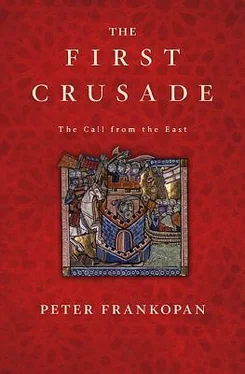Hugh’s eventual arrival in Constantinople was disappointing – though not because of the failure of the Byzantines to welcome him in sufficient style. In fact, he was shipwrecked after sailing into a heavy storm as he crossed from southern Italy, and was washed up on the shores of Epirus, separated from his possessions, as well as from much of his force, who were lost at sea. Retrieved and quickly brought to Dyrrakhion, Hugh was promptly spirited to Constantinople by Manuel Boutoumites, who was rapidly emerging as a key lieutenant, so that Alexios could placate him. 31As the Alexiad wearily puts it, ‘the episode concerning Hugh was just the start of it’. 32
Hugh of Vermandois was one of the first members of the Crusade proper to reach Constantinople, arriving at the end of October 1096. 33Godfrey of Bouillon and his brother Baldwin reached the capital around the same time. 34Robert of Flanders was not far behind, setting sail from Apulia in December. 35Stephen of Blois and Robert of Normandy, who were travelling together, must have set out later than the others, for they were only ready to cross from Italy in early April 1097. 36By then Bohemond had reached Constantinople, while Raymond of Toulouse was around a hundred kilometres away. 37
The journeys across Byzantine territory by the aristocrats recruited by the Pope and the emperor were generally pacific, though marked by occasional misunderstandings. Some were the result of overeagerness. When the contingent led by Richard of the Principate crossed over to Epirus, his lookouts mistook the Byzantine fleet for pirates, prompting the order for battle to be given. A volley of crossbow bolts was fired from the Crusaders’ ships, one of which struck the Byzantine commander, Marianos Maurokatakalon, on the helmet, while another went straight through his shield and body armour, lodging in his arm. A priest accompanying the western knights then became involved in the attack, seizing a bow and shooting arrows as fast as he could, before grabbing a sling and launching a large stone, which knocked Marianos out cold. As the officer was getting back on his feet after regaining consciousness, he was struck on the cheek by a barley cake which the priest was now throwing after running out of other missiles. 38
There were other mishaps on the way. The bishop of Le Puy was attacked as he paused to rest during the long march across Macedonia. Robbed of his mule and his gold, and beaten severely about the head, Adhemar escaped a worse fate as his attackers argued about money, alerting the bishop’s travelling companions who arrived in the nick of time to save his life. 39
Where things went wrong, Alexios was often held responsible, even though attacks like these were the work of opportunistic locals rather than imperial agents. As we shall see, subsequent events led to a highly coloured and negative picture of the emperor, with the effect that the Latin accounts are quick to focus on anything that could vilify Alexios. In this context, the silence of various sources about conditions during the march to Constantinople is remarkable. Not one of them comments on shortages of supply, which indicates that successful arrangements had been put in place to meet the needs of the expedition. This was no fluke: high-ranking officials were sent out by the emperor to meet the various contingents, with instructions to guide them safely to the capital. ‘Whenever we passed by any of their cities’, wrote one eyewitness, ‘this man [sent by Alexios] used to tell the people of the land to bring us provisions.’ 40Considerable planning and careful execution had gone into establishing, maintaining and provisioning markets along the arteries leading to the capital.
Escorts were assigned to the Crusaders to accompany them along the most efficient routes and to keep them moving and out of trouble. They were generally very successful in doing so, although one force was particularly rowdy. Bohemond and his men regularly left the main road to Constantinople to rustle livestock and other goods, and on one occasion set fire to a fort filled with what they deemed to be ‘heretics’. 41They also moved at a markedly slower speed than the other groups, suggesting that they took a dim view of the admon itions of the emperor’s agents. 42Their behaviour sharply improved on the arrival of an imperial guide, who prevented a proposed attack on a castle ‘filled with good things’, and convinced Bohemond to order that property plundered by his men be restored to the local population. 43
As the Crusaders neared Constantinople, Alexios took further steps to make a positive impression on the most important leaders, sending personal messages that stressed the generous reception they were to receive in the capital and underlining his friendship with them. He affirmed ties of solidarity, extending the hand of brotherhood and even presenting himself as a father figure. 44Yet contact between the western leaders was monitored carefully by the emperor to prevent contingents linking up before they reached Constantinople. 45While he was concerned mass arrival would put a strain on provisioning arrangements, there was also the more pertinent danger of an attack on the capital. Alexios took steps, therefore, to ensure that communications were regularly intercepted. 46He also sought to prevent trouble by inviting the various leaders to advance and meet him ahead of their forces. Hugh of Vermandois and Bohemond were brought swiftly to the capital, well ahead of their armies. 47The same would have been true of others whose journeys are recorded in less detail, such as Stephen of Blois and Robert of Flanders.
Raymond of Toulouse was reluctant to meet the emperor on his own: the count understood that travelling ahead without his men would weaken his position in any negotiations. 48His suspicions were well placed, for Alexios did indeed have an ulterior motive for meeting these prominent men one by one. He needed them to confirm their loyalty.
Alexios was a generous host, receiving the western leaders lavishly. In the summer of 1097, Stephen of Blois wrote to his wife Adela, daughter of William the Conqueror, reporting excitedly on his treatment in the imperial capital. The emperor showered gifts on all the leaders, he wrote, and took personal care to ensure supplies reached the western knights. ‘It seems to me that in our times, no other prince has had a character distinguished by such complete integrity. Your father, my love, gave many great presents, but he was almost nothing in comparison with this man. Writing these few words about him, so that you will have some idea of what sort of person he is, has given me pleasure.’ 49
Stephen’s letter reveals the level of attention paid to him by Alexios, who entertained him in the palace for ten days, giving him many gifts and asking Stephen to send his son to Constantinople so he could be honoured in a ‘great and distinguished manner’. The effect was that Stephen looked at the emperor not only as an excellent man and a generous benefactor, but ‘as a father’. 50
Stephen’s letter pre-dates the later collapse of relations between the emperor and the Crusaders, but even many of those writing later comment upon Alexios’ largesse. According to Fulcher of Chartres who took part in the Crusade, the emperor gave out large quantities of coins, as well as highly prized silk garments. 51Another eyewitness, scornful of Alexios’ generosity and mocking his credulity, stated that the westerners were encouraged to ask for anything they liked, including gold, silver, gems and cloaks. 52Even if it is not true that the emperor agreed to every request, it says much about his desire to win personal support from the expedition’s leaders that his generosity was perceived to be boundless.
The sources also agree that the most prominent Crusaders met with Alexios in person. This approach was a radical departure for a Byzantine sovereign. Foreign dignitaries visiting Constantinople were usually kept at a distance from the emperor. Princess Olga, a leading member of the ruling house of Kiev, was invited only to take dessert with the emperor when she came to the capital in the mid-tenth century, 53while an ambassador sent by the German emperor around the same time was kept waiting for days for an audience with the Byzantine sovereign. 54
Читать дальше











